Alcohol Withdrawal Symptoms | Alcohol Withdrawal Syndrome: Outpatient Management
Di: Samuel
Find ways to stay occupied: Look for ways to stay busy and distracted.
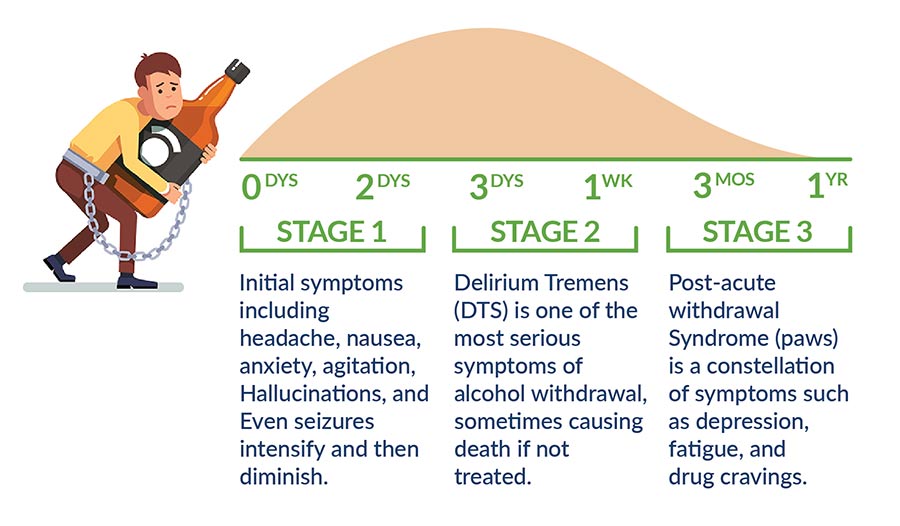
Benzodiazepines, like Valium and Ativan, are some of the most . Call the Alcohol Awareness hotline today at (855) 955-0771 to find a support group near . In most cases, alcohol withdrawal requires medical detox.This is often described as ‘alcohol dependence.
Alcohol Withdrawal: Symptoms, Timeline, Syndrome, and More
This can lead to behavioural symptoms such as seizures. Withdrawal symptoms start around 8 hours after the last alcoholic drink, and then may intensify over the next 24-48 hours.¹ Alcohol Withdrawal Symptoms There are two types of alcohol withdrawal, acute withdrawal and post-acute withdrawal, also known . Although these symptoms are relatively mild and aren’t usually deadly, they are extremely uncomfortable. The syndrome is due to . This kindling effect can also occur after chemical stimulus to the brain or body, such as anti-convulsant medication.Symptoms are primarily psychological, affecting a person’s mood, sleep patterns, and stress response. Some people may be prescribed medication to help achieve abstinence.
Introduction to Alcohol Withdrawal
Alcohol withdrawal — symptoms that develop when a person suddenly stops drinking alcohol after prolonged, heavy .Treatment for alcohol use disorder may include: Detox and withdrawal.Learn about alcohol withdrawal symptoms, timelines and how a medically-supervised detoxification setting can help you avoid complications. You may also be hot and cold, have goosebumps, or have a runny nose. Symptoms such as sleep changes, rapid changes in mood, and fatigue may last for months.Alcohol withdrawal is a product of physical dependence in the body. Read a book, go for a walk, talk to a friend, listen to music, or start a new hobby.
Alcohol Withdrawal: Symptoms, Timeline, and Treatment
Other Symptoms. Shakiness or jumpiness. In patients with delirium . When To See a Healthcare Provider.
Alcohol Withdrawal Syndrome: Outpatient Management
Alcohol withdrawal symptoms can occur as early as two hours after your last drink.Serious symptoms of alcohol withdrawal, such as seizures, hallucinations, confusion, high blood pressure, sweating, shallow breathing, and racing heart rate, may require immediate medical attention. When a person has reached a state of alcohol-dependent — the physical state where the body and brain require alcohol to feel well and function normally — their body experiences alcohol withdrawal symptoms once there is no more alcohol in their system.

Get enough sleep. Long-standing heavy drinkers can have bad symptoms. Many people continue to drink alcohol, even while knowing that alcohol addiction is ruining their life, just to keep these unpleasant withdrawal symptoms at bay. People who continue to drink a lot may develop health problems such as liver, heart, and nervous system disease.This happens because your body is making up for alcohol leaving your body and is adjusting to a state of keeping you stable. Acute alcohol withdrawal occurs during detox, the beginning of the healing process.We’ll start with the standard alcohol withdrawal timeline: Six-hour mark: The first symptoms (sweating, agitation, loss of appetite) appear. This can lead to seizures.The relationship between alcohol withdrawal and headaches is an intricate one.Alcohol withdrawal can occur when people stop drinking after a prolonged period (i. Withdrawing suddenly from alcohol, particularly if someone is a . Delirium tremens (DTs) is a severe symptom of alcohol withdrawal involving extreme agitation, anxiety, paranoia, hallucinations, disorientation, tremors, sweating, increased heart rate, increased body temperature, and high blood pressure that can be fatal.Detox: Detox involves going through the alcohol withdrawal process.’ When we then stop drinking alcohol, our central nervous system can become over excited and dysregulated, leading to various withdrawal symptoms. If you are dependent, symptoms can become . Get help today 888-685-5770 Helpline Information or sign up for 24/7 text support. If you’re dependent on alcohol to function, it’s recommended you seek medical advice to manage your withdrawal.
Alcohol Withdrawal
Severely dependent drinkers are often able to tolerate very high levels of alcohol in amounts that would dangerously affect or even kill some people.Withdrawal symptoms of suddenly stopping certain antidepressants include anxiety, chills, difficulty sleeping, dizziness, headaches, increased depression symptoms, irritability, muscle aches, nausea, sensations of electric shock, sleepiness, and vivid dreams.Alcohol affects many body systems, so the symptoms of alcohol withdrawal syndrome can vary widely. mental confusion. It often eases after a few days. This means a person’s . If withdrawal is interfering with your ability to function or if you feel you can’t cope, see your healthcare provider or talk with a therapist as soon as possible.Withdrawal can start 6 to 24 hours after your last drink.Clonidine is one of the medications that works with other tested drugs to help reduce the health-threatening symptoms of alcohol withdrawal syndrome. However, if you’re motivated and ready to give it your all, recovery from alcohol use disorder can absolutely be your reality.
Alcohol Withdrawal Syndrome
The timeline of alcohol withdrawal can vary. 24-48 hours: This would be the peak time for minor to moderate withdrawal.Alcohol: Not everyone who stops drinking alcohol has withdrawal symptoms, but most people who quit suddenly after drinking enough alcohol for any length of time can experience a wide range of symptoms.Alcohol withdrawal symptoms can be painful and potentially life-threatening, so it’s important to have people you can rely on. Withdrawal can involve a cluster of unpleasant, uncomfortable, and potentially dangerous symptoms that cause significant distress and impair a person’s ability to function. If you are not dependent, symptoms tend to ease after 24 hours.
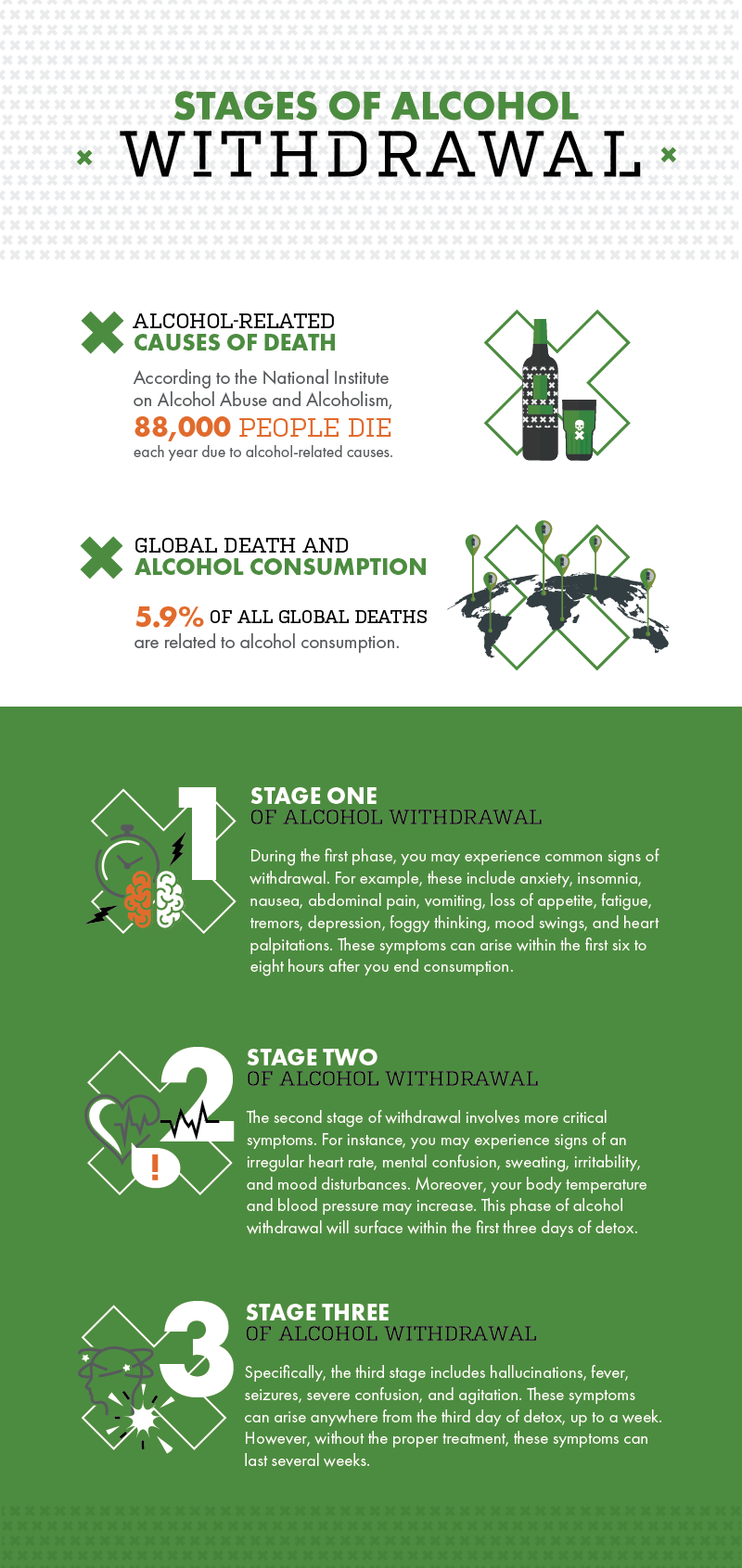
Symptoms of alcohol withdrawal range from mild to severe. Try meditation, deep breathing, exercise—whatever might help you rest your mind and body. having a higher pulse rate. The post-acute phase is when the brain rebalances itself. Treatment may begin with a program of detoxification — withdrawal that’s medically managed. Wanting to drink badly enough to block out thoughts of anything else. These symptoms can last a few weeks.Alcohol withdrawal syndrome occurs when someone who drinks alcohol heavily suddenly stops drinking.
Alcoholism: Definition, Symptoms, Traits, Causes, Treatment
Alcoholism Withdrawal Symptoms and Treatment
Alcohol has a slowing effect (also called a sedating effect or depressant effect) on the brain. Symptoms can be mild or severe, and may include: More severe withdrawal symptoms may also include fever, convulsions, and delirium tremens (DTs). Alcohol withdrawal symptoms roughly follow a timeline. Spending a lot of time drinking and/or dealing with severe symptoms of alcohol withdrawal.dependence withdrawal symptoms No alcohol on breath test Recent drinking pattern 3-4 days a week only Recent detox with last 2/52 Audit screen <15 Audit C < 8 Symptomatic and typical consumption 15-30 units per day Drinking to relieve withdrawal symptoms Evidence of significant No evidence or history of severe withdrawal complications . If you are ready to take the first step toward an alcohol-free lifestyle, contact our .Alcohol withdrawal symptoms. Typically, symptoms will peak within the first 24 to 48 hours upon cessation.Mild Short-Term Symptoms. Heavy drinkers who suddenly decrease their alcohol consumption or abstain completely may experience alcohol withdrawal (AW). The symptoms can range in severity and may include nausea, vomiting, and mood changes.During alcohol detox, patients are closely monitored by medical staff until their symptoms stabilize. A dependent drinker usually experiences physical and psychological withdrawal symptoms if they suddenly cut down or stop drinking, including: hand tremors – the shakes sweatingAlcohol withdrawal symptoms usually begin 6 to 48 hours after the last drink. In severe cases, you may develop delirium tremens. This involves the use of medications to treat symptoms like nausea, insomnia, seizures, dehydration, and more. These chemicals in our brain are responsible for providing us with feelings of wellbeing, pleasure, and euphoria. But most people don’t have serious or life-threatening problems.Approximately one-half of patients with alcohol use disorder who abruptly stop or reduce their alcohol use will develop signs or symptoms of alcohol withdrawal syndrome.Alcohol Detox Timeline. Symptoms include trembling (shakes), insomnia, anxiety, and other physical and mental symptoms.This can be extremely challenging, especially when you are experiencing flu-like symptoms that feel almost impossible to endure. Withdrawal happens because your brain gets used to the depressive effects of alcohol. nausea or feeling sick.Without medication, alcohol-withdrawal symptoms might be expected to peak about 72 hours after the last use of alcohol, but medications can reduce symptoms within hours. Severe withdrawal symptoms, especially for drugs and alcohol, can include:
Alcohol Withdrawal Timeline, Symptoms and Treatment
Detox and withdrawal symptoms. It may be deadly if not treated right away.Withdrawal symptoms are more common if you have been a heavy drinker.
Alcohol Withdrawal Syndrome: Management guidelines for adults
Gradually tapering your alcohol use helps ease withdrawal symptoms and reduce alcohol cravings.Alcohol withdrawal symptoms are caused by neurochemical changes in the brain, specifically by the depletion of dopamine, serotonin, gamma-aminobutyric acid (GABA), and opioid peptides.
Symptoms of Alcohol Withdrawal: Syndrome and Medication
DTs can cause confusion, panic, and hallucinations (seeing, hearing, or feeling things that aren’t real). This can not only take your mind off of your withdrawal symptoms; it can also help you combat alcohol cravings. Additional symptoms of alcohol withdrawal include headaches, insomnia, rapid heart rate, loss of appetite and enlarged pupils.
Addiction withdrawal symptoms
After approximately six hours without alcohol, an addict will likely begin to experience mild symptoms of withdrawal. You may also choose to attend self-help groups, receive extended counselling, or use a talking therapy such as cognitive . At approximately the 12th hour following the last drink, the individual may begin to experience hallucinations. If you are experiencing mild and moderate symptoms of withdrawal, it’s important to seek medical attention before more severe and potentially life-threatening . The symptoms: 1, 6, 7, 8. Alcohol withdrawal symptoms happen when a person stops drinking alcohol after frequent or heavy use. WebMD explains the symptoms and how to get through alcohol withdrawal at home. Common symptoms of withdrawal include: feeling anxious. These hallucinations . Severe withdrawal symptoms include delirium tremens, a major type of alcohol withdrawal characterized by sudden and severe psychological or nervous .
Alcohol Withdrawal Timeline: Symptoms and What to Expect
The most severe manifestations of withdrawal include delirium tremens, hallucinations, and seizures.Alcohol withdrawal may range from a mild and uncomfortable disorder to a serious, life-threatening condition. 12-24 hours: Symptoms, like confusion, problems concentrating and a rise in blood pressure, appear. While headaches may seem like a relatively benign complication compared to the other symptoms of alcohol withdrawal, which can include life-threatening seizures, the consistency and intensity of the headaches can make living with this particular symptom . With each alcohol withdrawal episode, the brain and nervous system becomes more sensitised and the resulting side effects become more pronounced. This is when you may experience the most uncomfortable of withdrawal symptoms, such as insomnia, rapid heartbeat, changes in blood pressure, sweating, tremors, and fever.
Withdrawal: Types, Symptoms, Treatment
Practice relaxation skills. DTs can be very serious if a doctor does not . You may need to take sedating medications to prevent withdrawal symptoms. Typically, mild symptoms begin within hours after the last drink and can become progressively more severe. Frequently drinking more than intended. 1 This page will . It can also help your body adjust to the lack of alcohol.
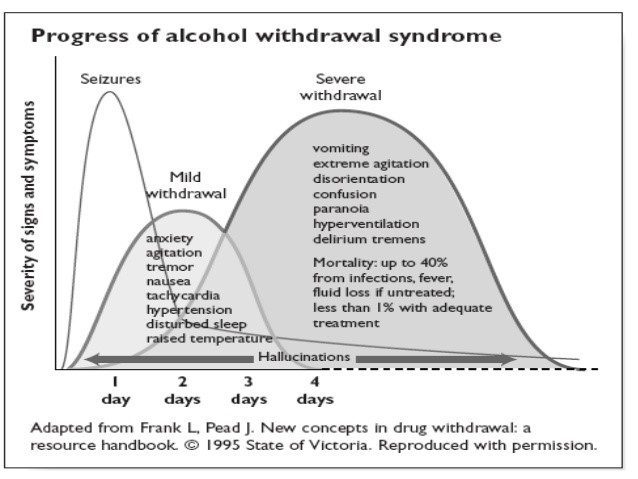
During the time of alcohol abuse, our . It can be uncomfortable and unpleasant.
Alcohol withdrawal timeline: Symptoms and more
Are more severe and may include hallucinosis, seizures, or even delirium in about every fifth person affected.
Withdrawal: Symptoms, Timeline, Treatment, and Coping
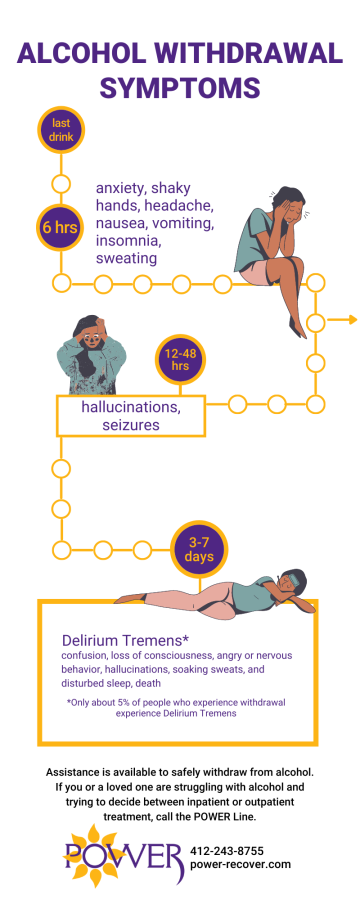
Alcohol use disorder
The abrupt discontinuation of alcohol causes alcohol withdrawal in people who have been heavy drinkers over a prolonged . How long withdrawal symptoms last. If your alcoholism is severe, you may need to go through medically supervised detox in order to manage your symptoms of alcohol withdrawal. Signs and symptoms of AW can include, among others, mild to moderate tremors, irritability, anxiety, or agitation.Alcoholism is characterized by some of the following behaviors: Having a desire to stop drinking but being unable to.Alcohol withdrawal is the changes the body goes through when a person suddenly stops drinking after prolonged and heavy alcohol use. raised blood pressure. Sometimes called detox, this generally takes 2 to 7 days. Some symptoms can be more severe and unpredictable, such .Symptoms of alcohol withdrawal can occur after a person suddenly stops drinking or suddenly strongly reduces drinking after prolonged and heavy exposure to alcohol. For some, these symptoms may peak within the first 24–48 hours after alcohol cessation, but they . Gradually Taper Your Alcohol Intake.
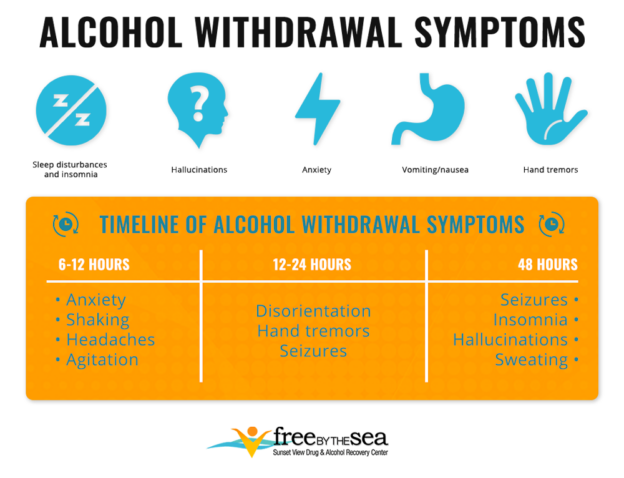
, weeks, months, years) of heavy alcohol use.
Alcohol Withdrawal: How to Get Through It
Does Clonidine Help with Alcohol Withdrawal?
PAWs symptoms typically come and go, lasting a few days at a time. This form of withdrawal can put a person in harm’s way if proper treatment for it is not sought. Detox may be inpatient or outpatient and involves the use of medications to control withdrawal symptoms and complications. Some people also experience tremors and seizures. hand tremors or shakes.
Alcohol Use Disorder: What to Expect When You Quit Drinking
Alcohol withdrawal occurs when a person suddenly stops (or significantly reduces) alcohol intake after long-term . These chemical changes affect how your nerve cells talk to each other. Heightened anxiety. In extreme cases, a person may experience a severe and dangerous form of alcohol withdrawal called delirium tremens.
3 Stages of Alcohol Withdrawal: Symptoms & Treatment
seeing things that are not there (hallucinations) nausea and vomiting. Symptoms of delirium tremens can include agitation, fever, hallucinations, . Many times those symptoms will trigger a relapse.Alcohol withdrawal timeline.Symptoms of alcohol withdrawal can occur as early as a few hours after a person’s last drink. In this article, learn about the signs and symptoms, as well as the treatment options. Also, be sure to get help if serious symptoms appear.
- Alexander Von Witzleben Vermögen
- Akute Nervenerschütterung | Gehirnerschütterung
- Aleppo Seifen | Aleppo Seife Active
- Albion Musa Live Stream , SPORT1 Livestream: 24h SPORT1 live online
- Albert Hofmann Zitate , Albert Hofmann: Das LSD ist zu mir gekommen
- Akuter Bauch Schmerzen Abdomen
- Al Manar Frequenz | Medienanstalten prüfen Vorgehen gegen Hisbollah-Sender
- Aldi Süd Bettwäsche 155X220 – dormia Flanell-Bettwäsche Komfortgröße
- Aktuelle Verkehrsmeldungen Braunschweig
- Aktuelle Leserkommentare _ Briefe an die Herausgeber: Aktuelle Leserbriefe
- Akustische Systeme Für Vogelabwehr
- Albertina Passage Restaurant _ Die 10 besten Restaurants nahe Albertina, Wien
- Aldi Süd Matratzen Testsieger _ Test: Aldi Süd Milsani Deutsche Markenbutter